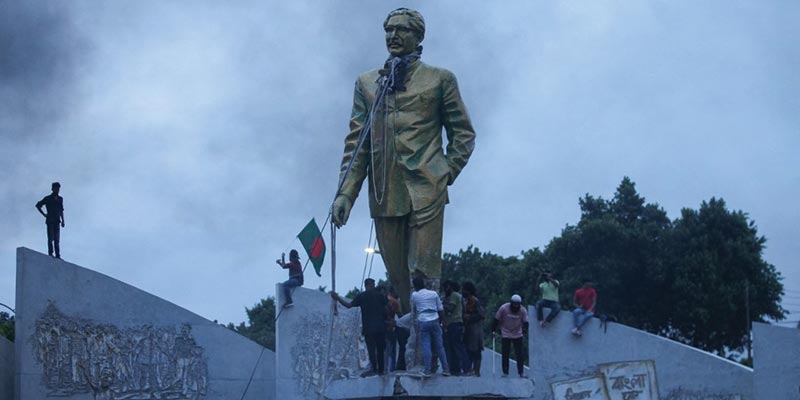- India
- Sep 11
- Kevin Savio Antony
Bangladesh to seek extradition of Sheikh Hasina from India
• Bangladesh will take necessary steps to extradite deposed Prime Minister Sheikh Hasina from India to try her on charges of mass killings during the student-led mass movement against her government, the newly-appointed chief prosecutor of the country’s International Crimes Tribunal said.
• Following unprecedented anti-government protests that peaked on August 5, Hasina resigned as Prime Minister and fled to India.
• Hasina’s government was accused of widespread human rights abuses, including the mass detention and extrajudicial killing of her political opponents.
• Dhaka has revoked her diplomatic passport, and the countries have a bilateral extradition treaty which would permit her return to face criminal trial.
Extradition treaty between India and Bangladesh
• Bangladesh has a criminal extradition treaty with India which was signed in 2013, while Sheikh Hasina’s government was in power, was then amended in 2016 to ease and hasten the exchange of fugitives between the two countries.
• The treaty was established to address the issue of fugitives from both India and Bangladesh seeking refuge in each other’s territories, particularly those involved in insurgency and extremist activities. Many Indian fugitives, especially from insurgent groups in the northeast, were hiding and operating from Bangladesh.
• Similarly, Bangladesh was facing challenges from outfits like Jamaat-ul-Mujahideen Bangladesh (JMB), whose operatives were hiding in Indian states such as West Bengal and Assam.
• This treaty facilitated the extradition of key figures, including the successful return of Anup Chetia, a senior leader of the United Liberation Front of Assam (ULFA), from Bangladesh to India in 2015.
• Since then, another fugitive has been extradited to India. In reciprocity, India has also handed over a few Bangladeshi fugitives under this treaty, reinforcing bilateral cooperation in addressing cross-border crime.
Key provisions of the treaty:
1) The treaty between India and Bangladesh requires the extradition of individuals who:
• Have been charged with
• Are wanted for
• Have been found guilty of
• Are being prosecuted for committing an extraditable offence, as determined by the courts of the requesting country.
2) An extraditable offence is defined as any offence carrying a minimum punishment of one-year imprisonment. This includes not only serious crimes but also financial offences.
3) The principle of dual criminality applies, meaning the offence must be recognised as punishable in both India and Bangladesh for extradition to be considered.
4) Extradition is also applicable for:
• Attempting to commit an extraditable offence.
• Aiding, abetting, or inciting others.
• Acting as an accomplice in the commission of such offences.
Are there exceptions to these rules?
Yes. A clause in the treaty, however, says extradition might be refused if the offence is of a “political character”. However, this exemption is restricted by a comprehensive list of offences that cannot be classified as political. These include:
• Murder or manslaughter (culpable homicide).
• Assault.
• Causing an explosion.
• Making or possessing explosive substances or weapons with intent to endanger life.
• Using firearms to resist or prevent arrest.
• Damaging property with the intent to endanger life.
• Kidnapping or taking a hostage.
• Incitement to murder.
• Any offence related to terrorism.
This extensive list ensures that serious crimes, particularly those endangering public safety, cannot be shielded by claiming a political exemption.
A diplomatic dilemma for India
1) International Law and the Serious Non-political Crime Bar: While Sheikh Hasina could potentially seek political asylum in India, certain offences she’s been charged with such as murder, enforced disappearance, and torture — are excluded from being classified as “political crimes” under the extradition treaty between India and Bangladesh. These serious charges make her case more complex in terms of extradition.
2) Charges Against Hasina: A murder case has been filed against Hasina and six others over the death of a grocery shop owner during last month’s violent clashes that led to the fall of her government.
• The case is the second to be filed against 76-year-old Hasina since she resigned and fled to India following widespread protests against her Awami League-led government over a controversial job quota system.
• On August 15, Hasina faced additional charges of murder, torture, and genocide in a third case.
3) 2016 Amendment to the Extradition Treaty: A 2016 amendment to Article 10(3) of the treaty simplified the extradition process by removing the requirement for evidence to be provided.
• Now, an arrest warrant issued by a competent court in the requesting country is sufficient for extradition proceedings.
4) Grounds for Refusal of Extradition: Article 7 of the treaty allows a refusal if the requested person could be tried in the courts of the requested state (India), which doesn't apply to Sheikh Hasina.
• Article 8 outlines additional grounds for refusal, such as accusations not made in good faith or related to military offences not considered criminal under general law.
• India could potentially argue that the accusations lack good faith, but this could strain diplomatic relations with Bangladesh’s new government.
5) India’s Dilemma: India faces a diplomatic challenge in balancing its strategic and economic interests with Bangladesh while also supporting Sheikh Hasina, a long-time ally.
• Handing her over could harm India’s relationship with her faction, the Awami League, and her supporters, but refusing extradition might complicate relations with the new government in Dhaka.
6) The Strategic Outlook: Many political experts emphasized that India’s critical interests are not served by extraditing Sheikh Hasina, and the legal nuances of the treaty are secondary to broader strategic ties.
• Bangladesh has deep-rooted connections with India through its administration, military, and geographic proximity. They suggesting that the bilateral relationship will remain strong regardless of individual political figures.
• Countries rarely trade fugitives when it jeopardizes their national interests. Any decision regarding Sheikh Hasina will ultimately be a political one.
(The author is a trainer for Civil Services aspirants.)


